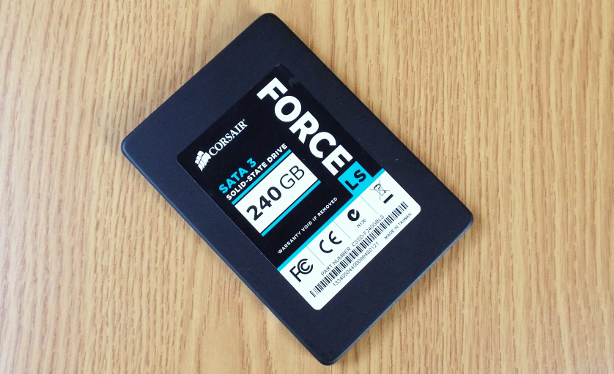REPORT ANALYSIS AND FINAL THOUGHTS
As implemented in Corsair’s Force Series LS 240GB SSD, the Phison PS-3108 controller is a solid performer. While the overall read performance of the Force LS is certainly competitive, the write speeds in many benchmarks were surprisingly strong. Whether write optimization is a characteristic strength of the Phison controller, or is a result of Corsair’s firmware implementation, remains to be seen. The jury will be out for some time on this new controller’s reliability, but it certainly seems to be hitting the ground running.
The Force Series LS SSDs are being marketed as “The flexible and economical SSD upgrade that’s backed by Corsair” — backed to the tune of a three year warranty. Pricing is a little difficult to assess since the Force Series LS SSDs are not yet even listed on Corsair’s U.S. webpage. Looking at pricing on the global webpage, we are not certain that the prices are in U.S. dollars. If they are, the M.S.R.P.s are definitely on the high side. Pricing works out to $1.68/GB for the 60GB model, $1.20/GB for the 120GB model, and $1.08/GB for the 240GB version. By contrast a SanDisk Ultra Plus 256GB SSD, which is a premium drive, can be found today on Amazon for a mere $0.59/GB! Granted, SSDs rarely sell at full M.S.R.P. once general availability occurs, but Corsair may find that some price-tweaking will be in order.
All in all, the Corsair Force Series LS 240GB SSD, featuring the Phison PS-3108 controller, makes a favorable first impression. On the positive side, the read performance is definitely competitive, even besting some SandForce drives in certain tests. The write performance is really a pleasant surprise. The 7.5mm form factor gives it broad usage compatibility. It supports S.M.A.R.T. and TRIM and comes with a three-year warranty. The product page for the Force Series LS SSDs can be viewed here.
On the negative side, the Force Series LS SSDs are not available in the U.S., one of Corsair’s potentially largest markets. At global website pricing, it is more expensive than competing, and even some superior drives. Prices usually adjust downward with full availability, and when the market forces of competition kick in. In order to truly call this a “budget” SSD, Corsair and/or its distributors need to get it to a more reasonable price point. IOPS in some tests seemed a bit low compared to other drives with similar maximum read/write speeds.
Depending on how the Phison controller holds up, Corsair seems to have another solid performing SSD on their hands. The increased write performance is nice to see, especially since it seems for the most part not to be at the expense of read speeds. Corsair’s ongoing efforts to make the SSD market more competitive by continuing to develop new controllers into new product lines makes them deserving of a tip of The SSD Review’s cap to their ongoing innovation. We vote the Force Series LS 240GB SSD our silver-level award.
 The SSD Review The Worlds Dedicated SSD Education and Review Resource |
The SSD Review The Worlds Dedicated SSD Education and Review Resource | 

On page 3 of the review your yellow heading for “Crystal Disk Info Ver 3.9.3” appears to need correcting to keep in line with the version used in the test: 5.6.2.
It’s just amazing, the time we live in. SATA III just came out a couple of years back and some of us are disappointed with the 6Gbps speed, which constituted “the latest and the greatest” what feels like just yesterday.
I am very much part of that group. When I heard about the newly refreshed iMacs, I was disappointed that Thunderbolt 2 wasn’t part of the equation, as I am very much looking forward to a 4K monitor as soon as they’re less cost-prohibitive, but when I read down the press release and found out the new specs included a new PCIe SSD, I immediately sold off my now former souped-up Mac mini, and placed my order for one of those babies.